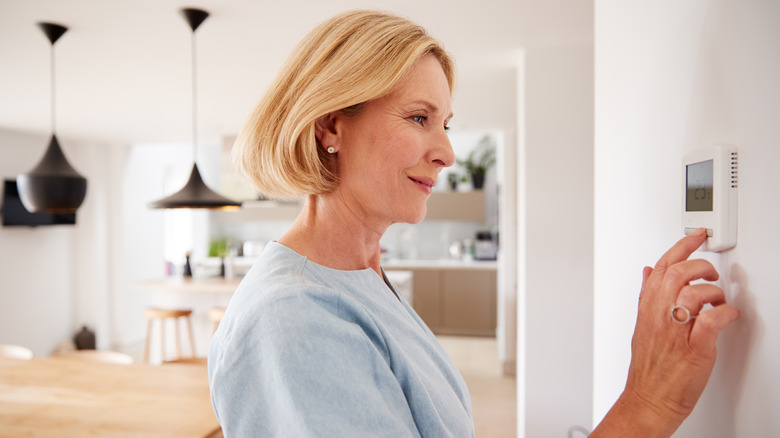When You Turn Your Thermostat Up Before Bed, This Is What Happens
There's nothing cozier than getting under the covers and turning up the temperature on a cold, winter's night. However, sleeping in an environment that is too warm can actually disrupt the quality and quantity of your sleep (via Cleveland Clinic). As it turns out, extreme temperatures can make it difficult for you to fall and stay asleep during the night. According to sleep psychologist Dr. Michelle Drerup, you are more likely to wake up if your bedroom is too hot or too cold.
"Thermoregulation is very important for staying in restorative, slow-wave sleep stages," Dr. Drerup told Cleveland Clinic. "These are the stages in which we get the most rest. Heat is a huge disruptor for REM sleep." That's because sleeping in a room that is too hot can cause your internal body temperature to rise, which can lead to restlessness. Ideally, your body temperature should decrease when you go to sleep.
What's the best temperature for sleep?
While there's no such thing as the perfect temperature for sleep, it's best to keep your bedroom around 65 degrees. This temperature allows your body temperature to decrease enough without making you too cold (via Healthline). More broadly speaking, however, the optimal sleeping temperature for adults can range anywhere between 60 and 67 degrees. Keeping your room within this range should make it easier for you to stay asleep during the night.
If this temperature range is too cold for you during the day, you can set your thermostat to drop a few degrees at night so the temperature in your room or home is slightly warmer earlier in the day. As the seasons change, you can adjust the temperature accordingly. Using a heavier comforter in the winter and a lighter one in the summer can also help regulate your body temperature, so you're not too hot or too cold at night.


